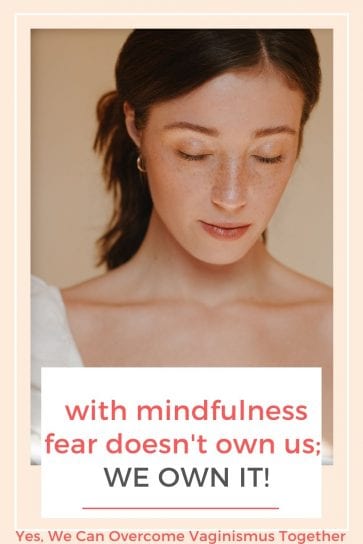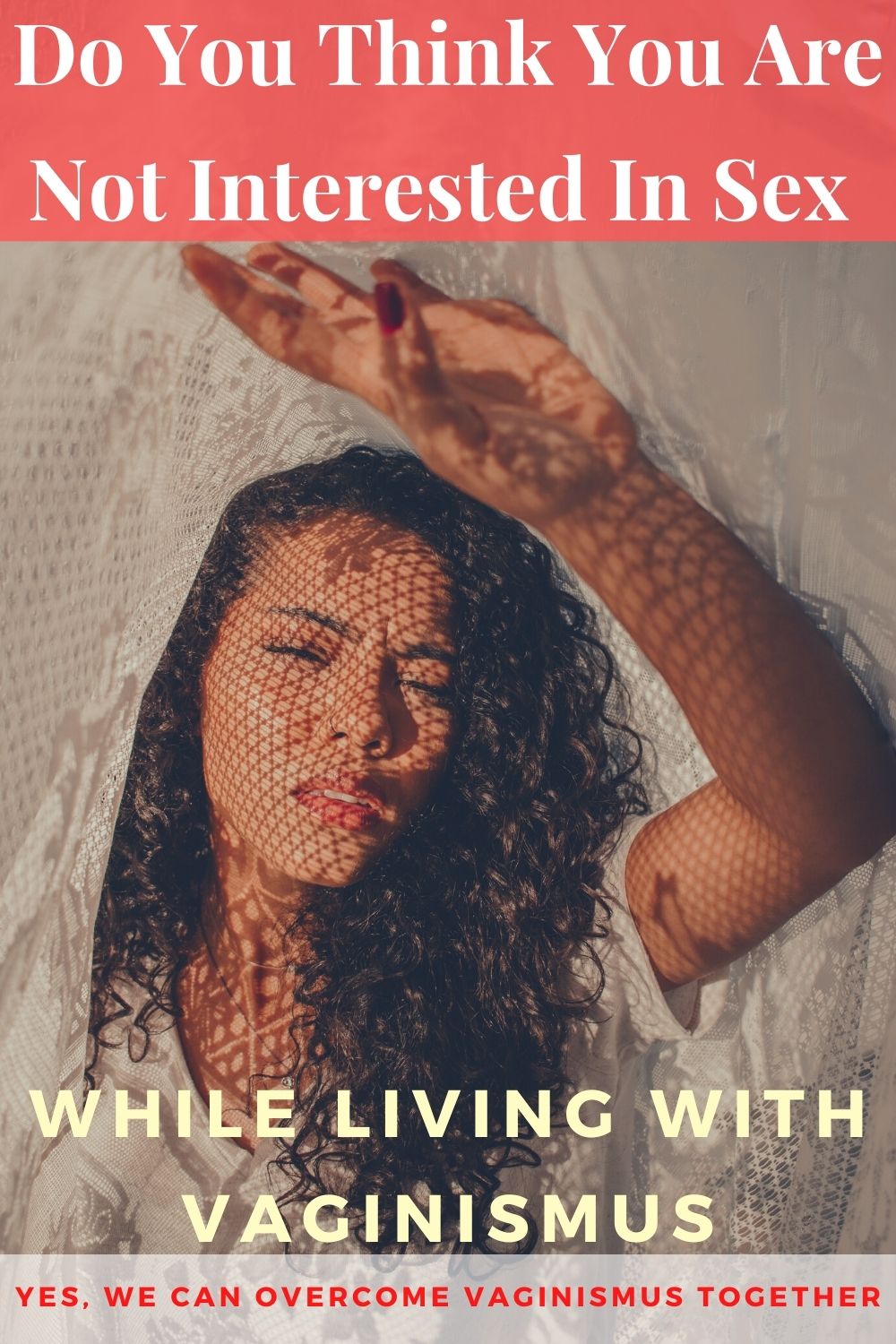You may have noticed that you are not interested in sex anymore since discovering that you live with vaginismus, and trust me, that’s OK.
But here is the thing: it doesn’t mean that it’s your truth, dear.
In this blog, we will dive into why we might lose our interest in sex while living with vaginismus and talk about how to see whether or not it’s a fact so that we can decide on what we need to do about it.
But before we get there, are you new here? Then you’ll have to check out these other helpful blogs that I’ve written to help you overcome your condition.
- Nothing is permanent in life; not even our vaginismus!
- Why Is It Important to Do Something to Heal Vaginismus Now?
- The Power of Experiential Learning, Especially While Healing Vaginismus
and of course, you should join our EXCLUSIVE Facebook Community “Yes We Can Heal Vaginismus Together” by clicking here!
Oh and, you can download here your FREE Vaginismus Overcoming Guide based on my personal experience and research!
I remember how back in the days of when I had vaginismus. I was convinced that I was not interested in having any form of sex at all. Back then, I thought perhaps it was a preference issue: maybe I was just interested in women.
I remember observing my feelings towards the women I admired and trying to see if there was any sexual desire in me. But NOPE! There was nothing, not even a hint.
Then I thought perhaps I was asexual.
But I was not 100% sure of this idea either.
This is because there was lots of heaviness around sex in my mind. I was very aggressive and aversive towards sex.
For me, sex meant a lot of things to me that I realize now are not the reality.
I believed that:
- Sex was only for men,
- Sex was something that women have to give to men,
- Men are active, and women are passive when it comes to sex,
These thoughts are what made me think that:
- Women must be passive,
- Women are dependant on men,
- Women are emotional and weak!
So I didn’t want to be a woman! I didn’t want to have penetrative sex. And that is no surprise, right!
Look how many unhealthy labels I had put on being a woman and having sex! And, these were done without even realizing it at the time!
So, of course, not only my vagina but my whole body was tense when it came to sex and how I thought about women in relation to men!
You could see how this attitude affected other areas of my life; while arguing, working, walking, and even talking!
I had to appear very strong and tough on the outside, but the truth was I felt very unconfident and fragile on the inside.
Whenever women’s rights came up in conversation, for instance, my rage could get out of control! Often there would be a lot of tension.
When I argued with someone, particularly with men, about anything to do with women, I had to compensate for my secret beliefs that women were not as worthy as men, which I didn’t like.
That was the dark side of me that I didn’t understand or wanted to accept for many long years!
All the while, the tension around my beliefs stayed, and for that reason, it even increased gradually!
Do you feel any tension when you say that you’re not interested in sex while living with vaginismus?
Think about it!
Do you have any tension in your voice or in your language while saying that you’re not interested in sex?
Could it be heard in your beliefs around having sex such as:
- It’ll be excruciating,
- I must give it to my partner,
- There is no way to have pain-free sex!
If those are not your beliefs, then ask yourself if you have any, and what they are, then write them down and look at them!
Our minds will automatically respond to beliefs the same way it would if they represented some sort of danger to your survival, and so, create tension which is not natural to sustain if left uninvestigated. As you dive into understanding your beliefs, perhaps you will see that what you say and how you act on the outside is just a cover to protect you from what you believe will protect you inwardly!
I don’t remember when my unhealthy thoughts started to control my body, but I do remember one scene from when I was around 7 or 8 years old when I saw my parents having sex.
They were under a blanket, and I saw their very fast up and down movements, which made me think at that moment;
“Oh, my dad is hurting my mom, and my mom has just to take it!”
I don’t have any idea of when or where I got these ideas about sex from, but somehow, I started to cultivate my aversion to sex and understanding of gender roles from a young age, using stories from movies and society to nourish this belief that sex was painful and scary for women.
For years and years, I held onto this belief until it became my thinking pattern: my habit.
Let’s take a look at how we react to our habits, especially while living with vaginismus and how to transform these unhealthier habits into ones that serve us better.
How do we react to our conditioning, especially while living with vaginismus?
The mind is such a miraculous sense! It’s defined as one of the core senses in Buddhism.
According to modern research as well as described in Buddhism: there are five components of the mind:
- the material form,
- our sensory consciousness,
- perception,
- feelings,
- and, formations
I’m not going to dive into each of them, but here is an example of how to understand the structure of it:
- You eat chocolate (the chocolate is a material form, it’s an object)
- You taste it on your tongue (being conscious of chocolate: sensory consciousness)
- Suddenly you start to think about something that the chocolate reminds you (perception), such as remembering your mom,
- Your unpleasant, pleasant or neutral feelings arise,
- Then you act accordingly, such as calling your mom.
All of this happens very quickly, most of the time on autopilot.
We even don’t realize how we end up responding to these senses until we look back at what we do. Any experience we have follows this process.
I can also give you an example of my sex attempts while I had vaginismus:
- I’d start to get intimate with my partner,
- I’d sense his body, each touch,
- He’d attempt to squeeze in between my legs, and suddenly I’d start to think about how it would be painful,
- Then I’d feel fear,
- And I’d push him back!
As you see, I’d react according to my conditioning automatically, without even realizing it.
So, how do I change this cycle of being on autopilot and reacting according to my hidden beliefs and thoughts, especially while living with vaginismus?
How to transform our unhealthy reactions into healthier ones while living with vaginismus
Our experiences in the past impact our responses now, so if we know how to explore our momentary reactions, we can create space to regulate ourselves to respond more healthily, dear.
One of the most effective methods is practicing mindfulness.
Mindfulness helps us recognize our habits, thinking patterns, and hidden conditionings.
As we become mindful of these habitualized thinking, feeling patterns, and sensations in our bodies and consider them with a bit more friendliness and gentleness, we break the autopilot cycle.
The most critical components of the process, “feelings,” shift gradually.
Instead of being led by these feelings, we learn to become observers able to act independently.
So, that instead of how we responded in the example, with mindfulness, fear doesn’t own us; we own it.

We see it as a habit, then pause, look at what we intend to do, then check in with our bodies and see how it manifests there, then come back to our breath and that very moment!
So the fear of pain comes and stays for a while but then passes on.
And we, my lovely friend, learn how to not react to it in a way that doesn’t serve us!
So are you ready to transform your habits into something that serves you more as you are healing vaginismus, dear?

“The power is within you. It always has been. How far are you willing to expand your horizons of thinking and stir that power awake?” Louise Hay
If you found this article helpful, then come and join our free online community Yes We Can Heal Vaginismus Together if you haven’t yet.
I talk more about these topics and in more detail.
Let’s meet there. Let’s grow together.

E-mail: petek@yeswecanhealtogether.com


